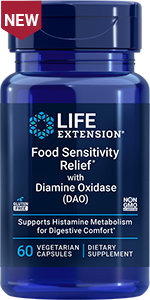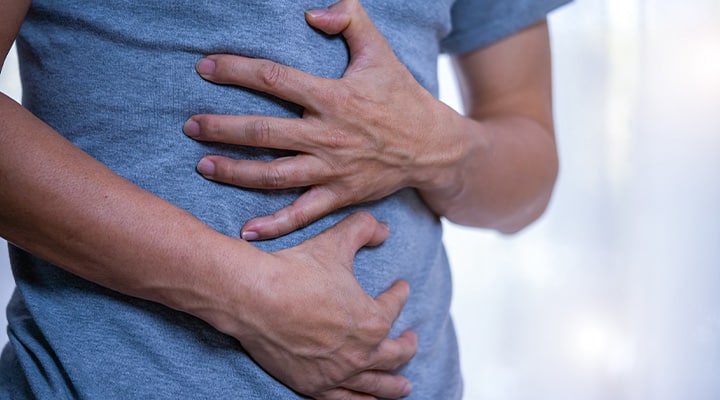
What Are DAO Supplements?
Published: November 2024
Who doesn't love a nice charcuterie board: those savory meats, creamy cheeses, a slice of fresh citrus fruit, all enjoyed with a glass of your favorite vino?
Well, your gut might not be a fan. For some people, occasional bloating, gas and stomach upset can accompany these tasty treats, and the culprit isn't always overeating (although that doesn't help).
Instead, the blame may belong to histamine sensitivity, a type of food intolerance that's due to the body's insufficiency at breaking down histamines in food (and those cocktail party favorites are particularly high in histamine).
Fortunately, you can supplement with diamine oxidase (DAO) to help alleviate this unpleasantness.
Here's everything you need to know about which foods are high in histamine, what happens when you have a histamine sensitivity, and how DAO supplements can help you make friends with your favorite foods again.
What foods are high in histamine?
Histamine is a compound produced by certain cells in your body, mainly cells of your immune system, that plays a role in various functions such as cognition, digestion, healthy inflammatory responses, and the dilation of blood vessels.
And this compound is in a number of foods—the more there is of it, the more of a challenge your body has to break it down during digestion. Below are some examples of foods that may be rich in histamine and related compounds:
- Beer
- Wine (particularly red wine)
- Canned or preserved fish such as tuna and sardines
- Shellfish
- Fermented foods like sauerkraut and kefir
- Aged, smoked and blue cheeses
- Cured meats and sausages
- Bacon
- Deli meats
- Eggs, especially raw egg whites
- Citrus fruits
- Bananas
- Papaya
- Strawberries
- Plum
- Kiwi
- Cherries
- Tomatoes
- Eggplant
- Spinach
- Avocado
- Soy sauce
- Vinegar
- Cinnamon and cloves
- Chocolate
- Cashews, walnuts and peanuts
What happens when you have histamine sensitivity?
Our bodies break down dietary histamine with a digestive enzyme called diamine oxidase. When there's an insufficient breakdown by diamine oxidase of these foods (which is more likely to happen when there's a high intake of foods high in histamine), it can accumulate to a point that may cause discomforts, including:
- Occasional gas
- Occasional stomach upset
- Occasional bloating
Histamine sensitivity is considered a food sensitivity, sometimes called a food intolerance, and is unique in that it isn't specific to one food but rather the presence of this compound in different foods. Nearly 20% of the Western world experiences some type of food sensitivity. You're not the only one looking to alleviate this occasional gastrointestinal discomfort from certain foods and ingredients!
Is Histamine Sensitivity a Food Allergy?
No! This is a food sensitivity, not an allergy. Allergic reactions are mediated by the immune system and can occur even when exposed to a small amount of the allergen. Sensitivities, on the other hand, are generally digestive in nature and depend on the amount of the food that was ingested.
Think of it like a garbage can slowly filling up with trash. In people with histamine sensitivity, the trash builds up faster than they can take it out. The goal for people with this sensitivity is to find the right balance to help alleviate discomfort.
Foods with a lot of digestive histamine are more likely to trigger sensitivity simply due to delivering more of this compound than the body can manage. Since many of these foods are nutritious (fruits, vegetables, healthy fats and proteins are all big sources), taking a DAO supplement is key to enjoying a well-rounded diet.
How does DAO work?
Digestive enzymes help our body break down foods for nourishment and digestion. The diamine oxidase enzyme is an enzyme that helps break down excess histamine in the body. It's the main enzyme that supports the healthy breakdown of intestinal histamine and encourages gastrointestinal comfort.
DAO is found mainly in the small intestine and acts as a system of checks and balances by breaking down histamine to regulate the amount we get from our diet with what our bodies produce naturally. People with histamine sensitivity may have diminished DAO activity, which affects their ability to break down dietary histamine. But just as you can take other digestive enzymes as a supplement, you can supplement with diamine oxidase enzyme to offer a helpful boost to your digestion.
Explore Our Best Digestive Health Supplements
What do DAO supplements do for you?
Many people take digestive enzyme tablets to help them process a meal better, especially after they've consumed large plates at hearty holiday feasts or an all-you-can-eat buffet. These enzymes help break down the nutrients in food—mainly protein, fats, and carbohydrates—to make it easier on the body.
But not every digestive enzyme works on every nutrient; some enzymes target carbohydrates whereas others target fats, so you may need to take a combination for the best effect. DAO supplements are unique in that they are also considered a digestive enzyme but are specific for histamine instead of a macronutrient.
Diamine oxidase supplementation can help your body process digestive histamine better, thus helping alleviate discomfort occasionally felt from certain foods. In a randomized clinical trial, participants who took DAO supplements 20 minutes before a main meal for eight weeks reported relief from occasional gastrointestinal discomfort. In fact, multiple clinical studies have found diamine oxidase supplementation to effectively relieve occasional discomfort from foods.
Pro tip: if you're a vegetarian, check the supplement label. Many traditional DAO formulas are derived from animal sources such as pork (often pig kidney), which might not be an ideal choice for everyone. If you avoid pork or other animal byproducts, look for a formula that derives its DAO enzyme from plants such as pea sprouts.
How should you take DAO supplements?
Like with any dietary supplement, DAO enzyme supplements should be taken according to the product label. These capsules or tablets are best taken before a heavy main meal like breakfast, lunch, or dinner because that is when you are likely to consume the most dietary histamine. This really lets the supplement shine as the DAO activity will help break down intestinal histamine.
Always consult your healthcare provider before adding any nutritional supplements to your diet. DAO supplements will not prevent severe reactions. Do not knowingly ingest food that you are allergic to, no matter the circumstance.
There are many supplements out there, and it's important to pick the one that's best for you. Not sure where to begin? A quick quiz is a great jumping-off point!
What else can you do for histamine sensitivity?
A DAO supplement is a wonderful invention, but it's not a magic bullet (or tablet!). So don't consider it a free pass to overeat or consume excess amounts of foods that don't sit well.
Here are some other ways to manage this and any other food intolerances you might have:
Mindful eating
: It is important to practice mindfulness when choosing what you eat so that you can limit occasional discomfort. That means focusing on your hunger cues, enjoying each bite, and stopping when you feel satisfied. Avoiding overeating is good advice whether you have a histamine sensitivity, a different food intolerance, or none of the above. (You'll enjoy your meals more if you don't stuff yourself, after all.)Promote healthy digestion
: Don't rush when you eat: take bites, chew, and hydrate during meals. Avoid eating too close to bedtime, so you'll have time to digest your food. Consider a light walk after meals to encourage healthy digestion. As an added bonus, you'll find that these simple adjustments may help you reach your weight loss goals, too!Try an elimination diet
: A great way to identify foods that don't sit well is an elimination diet. Simply put, you eliminate one type of food at a time to identify what the cause is. Once you've evaluated your diet and identified problematic foods, you may then reintroduce them in small amounts and—with the help of our trusty DAO enzyme—find a balance that allows you to enjoy the food sans discomfort. Being mindful of these trigger foods can also help promote a healthy gut lining—the vital barrier that controls what nutrients pass from the intestines into the blood. Who knew that such a small change could have such a large impact?Take foundational vitamins and supplements
: Being well-nourished is particularly important if some of the foods you eat are a bit of a struggle. Fun fact: magnesium is a cofactor in the production of the DAO enzyme. Many individuals in the United States do not obtain adequate amounts of this mineral through their diet, and a magnesium supplement is a great way to help support healthy levels.Add digestive health supplements
: Nourish a healthy gut by taking gut health supplements like probiotics, prebiotics and fiber. These can help maintain regularity and promote digestive comfort—talk about a win-win!
Working on your health is an ongoing holistic effort, and even the biggest journeys start with a small step.
References
- Comas-Basté O, et al. "Histamine Intolerance: The Current State of the Art." Biomolecules. August 2020. https://pubmed.ncbi.nlm.nih.gov/32824107/
- Izquierdo-Casas J, et al. "Diamine oxidase (DAO) supplement reduces headache in episodic migraine patients with DAO deficiency: A randomized double-blind trial." Clin Nutr. February 2019. https://pubmed.ncbi.nlm.nih.gov/29475774/
- Komericki P, et al. "Histamine intolerance: lack of reproducibility of single symptoms by oral provocation with histamine: a randomised, double-blind, placebo-controlled cross-over study." Wien Klin Wochenschr. January 2011. https://pubmed.ncbi.nlm.nih.gov/21165702/
- Manzotti G, et al. "Serum diamine oxidase activity in patients with histamine intolerance." Int J Immunopathol Pharmacol. March 2016. https://pubmed.ncbi.nlm.nih.gov/26574488/
- Okutan G, et al. "Exogenous Supplementation with DAO Enzyme in Women with Fibromyalgia: A Double-Blind Placebo-Controlled Clinical Trial." J Clin Med. October 2023. https://pubmed.ncbi.nlm.nih.gov/37892588/
- Sánchez-Pérez S, et al. "Low-Histamine Diets: Is the Exclusion of Foods Justified by Their Histamine Content?" Nutrients. April 2021. https://pubmed.ncbi.nlm.nih.gov/33919293/
- Yacoub MR, et al. "Diamine Oxidase Supplementation in Chronic Spontaneous Urticaria: A Randomized, Double-Blind Placebo-Controlled Study." Int Arch Allergy Immunol. 2018. https://pubmed.ncbi.nlm.nih.gov/29698966/
- "Low Histamine Diet." Hopkins Medicine. October 2022. https://www.hopkinsmedicine.org/-/media/johns-hopkins-childrens-center/documents/specialties/adolescent-medicine/cfs-low-histamine-diet.pdf
Like what you read?
Please subscribe to get email updates on this blog.









